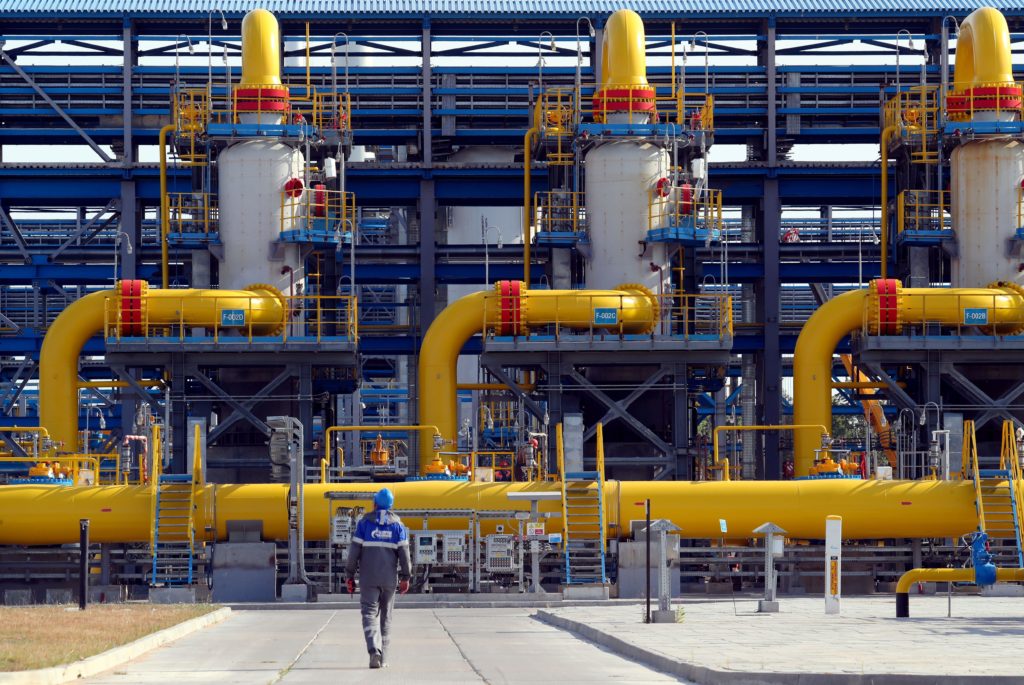Gas prices in Europe rose sharply after Germany’s energy regulator suspended the certification process for the Nord Stream 2 underwater pipeline intended to take Russian gas to European customers.
Russian gas giant Gazprom said in September that construction of the pipeline under the Baltic Sea – and circumventing the longstanding transit route through Ukraine — was complete and ready for shipments of gas westward. Gazprom has said that the 1,230-km Nord Stream 2 link could ship 5.6 billion cubic metres of fuel to Europe this year.
But the suspension of the certification process by the Bundesnetzagentur is likely to delay its entry into service for several months. And approval must also be secured from the European Union’s Executive Commission.
Under EU rules, gas producers have to be separate from the company that owns the pipeline.
Ukraine and Poland have led opposition to the project, which they say could be used by Moscow as a political weapon in the region. Ukraine stands to lose $2 billion dollars a year for lost transit fees once the contract for sending gas through the Ukrainian gas transit network expires in 2024.
The United States has also voiced objections to the project, but President Joe Biden dropped all sanctions imposed in connection with its construction on grounds that it was all but completed when he took office.
British Prime Minister Boris Johnson said this week that Europe faced a choice “between mainlining ever more Russian hydrocarbons in giant new pipelines and sticking up for Ukraine and championing the cause of peace and stability”.
The regulator said the pipeline’s operating company needed to be compliant with German law before it would proceed with certification of the 10 billion euro project. And that meant that the operator had to be “organised in a legal form under German law”.
Meeting German laws
And the procedure would remain suspended, it said, until its assets had been transferred from the Nord Stream 2 parent company based in Switzerland to a German subsidiary that Gazprom has agreed to set up.
A German court earlier this year dismissed a bid by Gazprom’s Swiss-based subsidiary Nord Stream 2 AG, to sidestep European Union rules requiring gas producers to be legally separate from entities that transport the fuel.
Wholesale gas prices in Britain and continental Europe leapt 17 percent after the certification process was suspended amid uncertainty over future gas supplies across the continent. Gas prices surged in September over similar supply concerns, unseasonably cold winter and low levels of storage and before easing somewhat.
“Markets are incredibly jittery,” Nikos Tsafos, an expert in energy and geopolitics at the Center for Strategic and International Studies in Washington, told CNN. “The lack of certification adds to that anxiety.”
Ukrainian President Volodymyr Zelensky led a high-profile campaign for months to persuade Biden to intensify opposition to the project, which he described as a “dangerous geopolitical weapon”.
Ukraine welcomes suspension
Yuri Vitrenko, head of Ukraine’s state oil and gas company Naftogaz, cautiously welcomed the regulator’s announcement.
“The suspension of Nord Stream 2 is good news,” he said. “But things are not so clear-cut. Gazprom will resort to legal tricks.”
The head of Poland’s PGNiG state oil and gas company suggested it was Polish arguments that had persuaded the German regulator to order the suspension. And the company called for energy solidarity in the EU to ensure the security of supplies.
Earlier this year, Biden and outgoing German Chancellor Angela Merkel clinched a deal for Nord Stream 2 to proceed, including support for Ukraine in developing alternative energy and hydrogen production.

